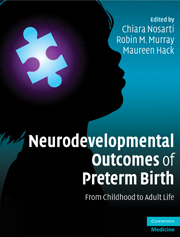Book contents
- Frontmatter
- Contents
- List of contributors
- Preface
- Section 1 Introduction
- Section 2 Neuroimaging
- Section 3 Behavioral outcome
- Section 4 Neuropsychological outcome
- Section 5 Applied research
- 16 Academic performance and learning disabilities
- 17 Pathways of risk and resiliency after prematurity: role of socioeconomic status
- 18 Cognitive and behavioral interventions
- Section 6 Conclusions
- Index
16 - Academic performance and learning disabilities
from Section 5 - Applied research
Published online by Cambridge University Press: 06 July 2010
- Frontmatter
- Contents
- List of contributors
- Preface
- Section 1 Introduction
- Section 2 Neuroimaging
- Section 3 Behavioral outcome
- Section 4 Neuropsychological outcome
- Section 5 Applied research
- 16 Academic performance and learning disabilities
- 17 Pathways of risk and resiliency after prematurity: role of socioeconomic status
- 18 Cognitive and behavioral interventions
- Section 6 Conclusions
- Index
Summary
Introduction
Recent advances in neonatal intensive care have resulted in survival of increasing numbers of children with very low birth weight (VLBW, < 1500 g) or very preterm birth (VPTB, < 32 weeks' gestational age [GA]) [1]. Because many of these survivors have neurological abnormalities and other neonatal complications, they are at high risk for an array of neurodevelopmental problems. Studies following children with VLBW or VPTB (i.e., VLBW/VPTB) into early childhood show that they have higher rates of neurosensory and other health disorders, more problems in behavior and socialization, and lower scores on tests of mental, language, and motor skills than control groups of children born at term with normal birth weight (NBW, ≥ 2500 g) [2]. These problems are more common and severe for children born at the limits of viability, such as those with extremely low birth weight (ELBW, < 1000 g) or extremely preterm birth (EPTB, GA < 28 weeks).
Problems in academic achievement and school performance are apparent soon after school entry [3–8]. Learning difficulties are manifest in failure to meet classroom expectations as indexed by grade repetition or the need for special education assistance, parent and teacher reports of poor school performance, and low scores on tests of academic skills, such as those assessing reading, spelling, mathematics, and writing. These problems are more common than persisting health disorders or global developmental impairments, with many survivors experiencing relatively selective impairments in academic achievement.
- Type
- Chapter
- Information
- Neurodevelopmental Outcomes of Preterm BirthFrom Childhood to Adult Life, pp. 209 - 223Publisher: Cambridge University PressPrint publication year: 2010
- 1
- Cited by



